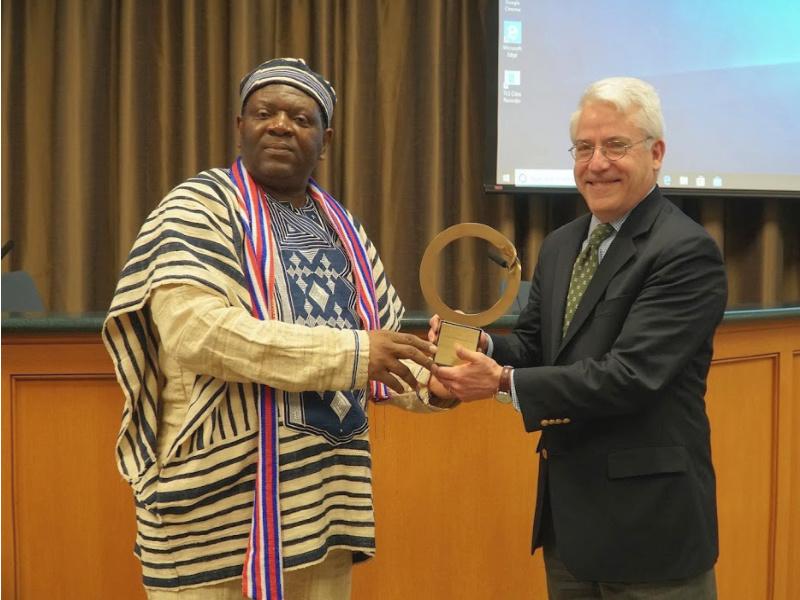Alum who saved Liberian rainforests leaves Goldman Prize at Tulane Law
In a moving tribute to Tulane Law and in recognition that his life remains in danger in his native Liberia, an alumnus who won one of the environmental world's most prestigious prizes, has bestowed it on Tulane for safekeeping.
"At Tulane Law I feel at home," said Alfred Brunell (LLM'02) who in 2019 won the Goldman Environmental Prize for his work saving hundreds of thousands of acres of Liberain rainforests from palm oil industry development. In giving the prize a home at Tulane Law in early March during the 25th annual Tulane Environmental Law and Policy Summit, Brunell gave a warm tribute to Prof. Oliver Houck, whom he said had influenced him as he helped the indigenous tribes of Liberia to save their ancestral home.
During his visit in early March, Brunell became the first Distinguished Visitor in Residence of the Tulane Center for Environmental Law, speaking to students and working with faculty through environmental law classes, conducting “mini-salons” with students to addressing issues of interest.
"While Alfred’s work and experience may seem far removed from that of our students, it really isn’t," said Mark Davis, Director of the Tulane Center for Environmental Law (TCEL). "When you boil it down, it is all about the rule of law and access to justice. Lawyers matter and Alfred proves it. That is what Tulane Law is really all about."
In addition to leaving the prize at Tulane Law, he also left the ceremonial clothes he wore to receive the prize, all made by members of tribes that he helped.
Brownell remains in exile in the United States. He faced harassment and death threats for his work, forcing him to flee his country; he is now the Tom and Andi Bernstein Human Rights Fellow at Yale University, after serving as a Distinguished Scholar in Residence at Northeastern University School of Law Program on Human Rights and the Global Economy.
Brownell is widely recognized as one of the leading defenders of environmental and human rights in Africa. As a litigator, he has served as lead counsel not only to Green Advocates, an organization he helped found, but also to its community partners, which together represent thousands of indigenous peoples in West Africa. He has championed the recognition of the customary land and property rights of local communities and indigenous groups against logging, the palm oil industry, and big agro.
“I have witnessed firsthand the stigmatization, threats, violence and criminalization of indigenous peoples, local communities and defenders in my native Liberia,” Brownell wrote in a recent Tulane Center for Environmental Law newsletter.
The TCEL launched in March of 2019 as an organizing hub to what is already one of the nation’s most comprehensive curricula in the concentration of environmental law. Tulane boasts the largest faculty-supervised environmental legal clinic in the country and an influential think-tank on water law and policy.
Brownell’s visit is part of ongoing efforts to bring scholars from around the world to collaborate with law faculty and others across the university as well as mentor environmental law students.

